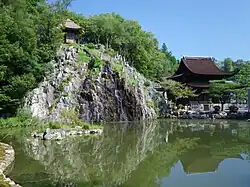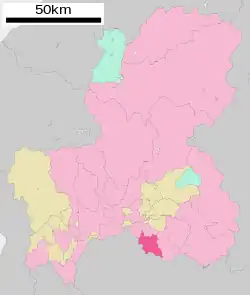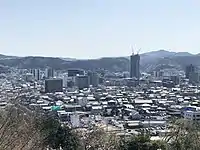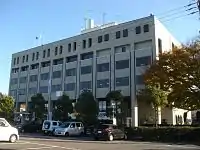Tajimi
Tajimi (多治見市, Tajimi-shi) is a city located in Gifu, Japan. As of 1 March 2020, the city had an estimated population of 110,070 in 46,580 households,[1] and a population density of 1200 people per km2. The total area of the city was 117.01 square kilometres (45.18 sq mi). The city is famous for its production of Mino ware ceramics, especially in the Oribe and Seto styles. Tajimi is a member of the World Health Organization’s Alliance for Healthy Cities (AFHC).[2]
Tajimi
多治見市 | |
|---|---|
 Eihō-ji(Kannon Hall) | |
 Flag  Emblem | |
 Location of Tajimi in Gifu Prefecture | |
 Tajimi | |
| Coordinates: 35°19′58″N 137°07′53.6″E | |
| Country | Japan |
| Region | Chūbu |
| Prefecture | Gifu |
| Government | |
| • Mayor | Masanori Furukawa (since April 2007) |
| Area | |
| • Total | 91.25 km2 (35.23 sq mi) |
| Population (March 1, 2020) | |
| • Total | 110,070 |
| • Density | 1,200/km2 (3,100/sq mi) |
| Time zone | UTC+9 (Japan Standard Time) |
| Phone number | 0572-22-1111 |
| Address | 2-15 Hinode-machi, Tajimi-shi, Gifu-ken 507-8703 |
| Climate | Cfa |
| Website | Official website |
| Symbols | |
| Flower | Azalea, Platycodon grandiflorus |
| Tree | Ginkgo biloba, Magnolia stellata |

Geography
Tajimi is located on the southern border of Gifu Prefecture with Aichi Prefecture. The Kiso River and the Shōnai River flow through the city.
Climate
The city has a climate characterized by hot and humid summers, and relatively cold winters (Köppen climate classification Cfa). The average annual temperature in Tajimi is 15.2 °C (59.4 °F). The average annual rainfall is 1,644.3 mm (64.74 in) with July as the wettest month. The temperatures are highest on average in August, at around 34.1 °C (93.4 °F), and lowest in January, at around −1.9 °C (28.6 °F).[3] Tajimi set the record for Japan's highest recorded daytime temperature of 40.9 °C (105.6 °F) on August 16, 2007.[4][5]
| Climate data for Tajimi (1991−2020 normals, extremes 1978−present) | |||||||||||||
|---|---|---|---|---|---|---|---|---|---|---|---|---|---|
| Month | Jan | Feb | Mar | Apr | May | Jun | Jul | Aug | Sep | Oct | Nov | Dec | Year |
| Record high °C (°F) | 18.2 (64.8) |
22.1 (71.8) |
25.4 (77.7) |
31.0 (87.8) |
34.5 (94.1) |
37.0 (98.6) |
40.7 (105.3) |
40.9 (105.6) |
38.5 (101.3) |
33.1 (91.6) |
25.5 (77.9) |
22.1 (71.8) |
40.9 (105.6) |
| Average high °C (°F) | 9.5 (49.1) |
10.9 (51.6) |
15.0 (59.0) |
20.7 (69.3) |
25.5 (77.9) |
28.5 (83.3) |
32.3 (90.1) |
34.1 (93.4) |
29.8 (85.6) |
23.9 (75.0) |
17.8 (64.0) |
11.9 (53.4) |
21.7 (71.0) |
| Daily mean °C (°F) | 3.2 (37.8) |
4.2 (39.6) |
8.1 (46.6) |
13.7 (56.7) |
18.6 (65.5) |
22.5 (72.5) |
26.4 (79.5) |
27.7 (81.9) |
23.8 (74.8) |
17.5 (63.5) |
11.1 (52.0) |
5.6 (42.1) |
15.2 (59.4) |
| Average low °C (°F) | −1.9 (28.6) |
−1.5 (29.3) |
1.8 (35.2) |
7.0 (44.6) |
12.3 (54.1) |
17.6 (63.7) |
22.0 (71.6) |
22.9 (73.2) |
19.1 (66.4) |
12.4 (54.3) |
5.7 (42.3) |
0.4 (32.7) |
9.8 (49.7) |
| Record low °C (°F) | −9.3 (15.3) |
−9.3 (15.3) |
−6.7 (19.9) |
−2.5 (27.5) |
1.0 (33.8) |
7.4 (45.3) |
14.2 (57.6) |
15.0 (59.0) |
6.9 (44.4) |
0.9 (33.6) |
−2.7 (27.1) |
−7.5 (18.5) |
−9.3 (15.3) |
| Average precipitation mm (inches) | 57.1 (2.25) |
69.7 (2.74) |
121.2 (4.77) |
132.5 (5.22) |
157.5 (6.20) |
187.5 (7.38) |
239.7 (9.44) |
149.6 (5.89) |
233.7 (9.20) |
155.1 (6.11) |
83.9 (3.30) |
60.6 (2.39) |
1,644.3 (64.74) |
| Average precipitation days (≥ 1.0 mm) | 6.9 | 7.4 | 9.7 | 10.3 | 10.6 | 12.2 | 13.1 | 10.3 | 11.5 | 9.8 | 7.1 | 7.8 | 116.7 |
| Mean monthly sunshine hours | 164.8 | 167.3 | 198.1 | 202.5 | 206.0 | 147.4 | 170.8 | 209.4 | 163.9 | 166.5 | 158.2 | 158.2 | 2,113.9 |
| Source: Japan Meteorological Agency[5][3] | |||||||||||||
Mountains
- Mt. Takane (556.3 m) The highest peak in the city.
- Kasahara Fuji (471.8 m) -The second highest peak, on the border with Seto City in Shiomi Park .
- Mt. Hogetsu (456.5 m)
- Mt. Miroku (436.6m) - located on the border with Kasugai City, on the Tōkai Nature Trail.
- Mt. Doju (429 m)
- Mt. Kosha (416.6 m)
- Mt. Sengen (372 m)
- Mt. Takane (225.6 m)
Rivers
- Kiso River
- Shōnai River
- Kasahara River
- Ohara River
- Shinzawa River
- Ichinokura River
- Gojō River
Demographics
Per Japanese census data,[6] the population of Tajimi peaked around the year 2000 and has declined since.
| Year | Pop. | ±% |
|---|---|---|
| 1970 | 76,846 | — |
| 1980 | 87,812 | +14.3% |
| 1990 | 106,213 | +21.0% |
| 2000 | 115,740 | +9.0% |
| 2010 | 112,595 | −2.7% |
| 2020 | 106,732 | −5.2% |
History
The area around Tajimi was part of traditional Mino Province. During the Edo period, much of the area was tenryō territory under the direct control of Tokugawa shogunate. In the post-Meiji restoration cadastral reforms, Toki District in Gifu Prefecture was created, and the town of Tajimi was established on July 1, 1889 by the creation of the modern municipalities system. Tajimi annexed the town of Toyota from neighbouring Kani District in 1934, and was raised to city status on August 1, 1940.
Tajimi subsequently annexed the villages of Koizimi and Ikeda from Kani District in 1944, and the villages of Ichinokura and Kasahara from Toki District in 1951. On January 23, 2006 the town of Kasahara (from Toki District) was merged into Tajimi.[7]
Government

Tajimi has a mayor-council form of government with a directly elected mayor and a unicameral city legislature of 24 members.
Economy
Tajimi is traditionally known for ceramics, mostly ceramic tiles and tableware, although due to increasing competitive pressures, especially from imported sources, only a few producers remain within the city limits, and economic activity in ceramics is increasingly orientated towards trade and wholesaling.
Education
Tajimi has 13 public elementary schools and eight public middle schools operated by the city government and one private combined middle/high school. The city has three public high schools operated by the Gifu Prefectural Board of Education. The Nagoya Institute of Technology has a campus in Tajimi.
Sister City relations
 - Terre Haute, Indiana, United States, since September 1962
- Terre Haute, Indiana, United States, since September 1962
Local attractions
- Eihō-ji, a Zen monastery
- Museum of Modern Ceramic Art, Gifu
- Mino International Ceramics Festival (every three years)
References
- Tajima city official statistics(in Japanese)
- Alliance for Healthy Cities official home page
- 気象庁 / 平年値(年・月ごとの値). JMA. Retrieved April 28, 2022.
- Gifu Prefecture sees highest temperature ever recorded in Japan - 40.9 Archived 2016-08-18 at the Wayback Machine - Japan News Review
- 観測史上1~10位の値(年間を通じての値). JMA. Retrieved April 28, 2022.
- Tajimi population statistics
- 多治見市と笠原町 合併の歩み. Tajimi official website (in Japanese). Archived from the original on September 27, 2011. Retrieved August 20, 2011.
External links
 Media related to Tajimi, Gifu at Wikimedia Commons
Media related to Tajimi, Gifu at Wikimedia Commons- Official website (in Japanese)
.jpg.webp)
